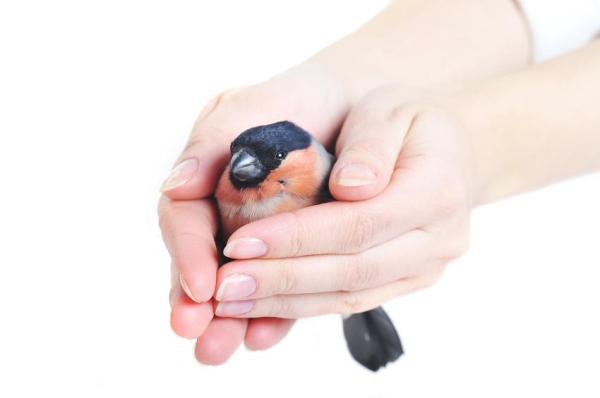
Do you have a bird and want to prevent it from escaping? Keep reading, because in this article we'll give you some tips to make your bird feel comfortable and at no risk of escaping. You must make sure it lives in a stimulating space, it doesn't lack in anything, and educate it to be with you outside of the cage without flying off. You must not forget that a cage is no place for a bird. So, if you decide to get one and want to prevent your birds from escaping, give your little ones the best possible life and spoil them rotten with all the attention birds deserve. Today, at OneHowTo we explain how to prevent birds from escaping.
To begin with, if you want to prevent your bird from escaping, it is essential that you offer it a large birdcage. If you have a terrace or a large balcony, put up a tailor-made birdcage so that your pet can move with relative ease.
You should furnish your birdcage with all kinds of accessories so that your bird can perch and sleep. Include sticks staggered at different heights so that your bird can climb. Put in a swing, a mirror or any other object that you think it might like. Keep trying different combinations and see which one your bird likes best. If it is happy, your bird is unlikely to escape.

Another very important aspect which will make your bird feel at home in its cage and prevent it from escaping is the proximity of the birdcage to a source of natural light. If you have a terrace and the weather is good, you can place the cage there. If this is not the case, you should place it by the window.
A good environment is essential for the bird's emotional welbeing and in order to ensure it has a healthy life. If you want to prevent your bird from escaping, never leave your bird in a dark, quiet room. You'll see that if you place the cage somewhere with a view, and in contact with sunlight, your bird will feel comfortable. Also, if it's nearby you, you should interact with it.
In order to make your bird happy and prevent it from escaping, It is also preferable for you to place the cage on a flat surface and in an area where there is little noise.
For your bird not to feel the urge to escape, you should provide it with everything it needs. Above all, it should always have food and water available.
Birds are very picky about what they eat and drink, and if they don't like something, they will reject it. Taking good care of their diet is very important if you want to prevent birds from escaping. You should change the water in its dispenser on a daily basis to prevent food debris or excrement from getting inside. As far as food is concerned, you should give your bird a soup spoon or more (depending on your bird's dietary requirements) of its favourite seed. It's important to replace food on a daily basis, since it is possible for it to get confused between the new seeds and the waste food and, therefore, become malnourished.

Beside sticks, a feeder and a water dispenser, your bird should have toys in its cage. Choose toys of different shapes, colours, sizes, and textures - you can even choose toys that make a sound if they're not too loud. Entertainment will help prevent birds from escaping.
Remember that the happier and more satisfied your bird is, the less chance there will be of it trying to escape.
If you want your pet to leave the birdcage without escaping, you'll need to train it to do so. If you don't do it, your bird may try to escape. You can start by training your bird to perch on your finger. Put your finger in front of it and say "up"; each time it does it, give it a treat.
You must also practice this trick when you do not put the bird back to the cage, so that it doesn't begin to associate it with going back in. Put it inside and let it go out, so that it doesn't understand that the return to the cage will be for a prolonged period. Besides trying with your finger or hand, you can try to get it to perch on top of a stick. Training is one of the most important aspects of preventing your bird from escaping.

Some specialists recommend you perform such procedure every time you return the bird to the cage, so that it is the bird who decides when to go back in on its free will.
When you've got your bird in your hand or on your finger, you should (gently) grab it so that it doesn't fly off - especially on the first few occasions. One way to do this is to press your thumb against your index finger to secure the bird's legs. Otherwise, you can carefully hold its back to prevent it from spreading its wings. Keep trying those positions throughout the training process, so that your bird gets used to it and doesn't anticipate its return to the birdcage. You will see how easy it is to get your bird to perch on you, and successfully prevent your bird from escaping.
If you want to read similar articles to How To Prevent Birds from Escaping, we recommend you visit our Pets category.